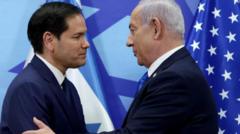In a recent meeting in Jerusalem, Israeli Prime Minister Benjamin Netanyahu lauded President Donald Trump's ambitious vision for Gaza’s future, indicating a strong US-Israel alliance focused on eradicating Hamas and strengthening regional security, despite widespread criticism of the proposed plan.
**Netanyahu Commends Trump's Vision for Gaza Amid US-Israel Talks**

**Netanyahu Commends Trump's Vision for Gaza Amid US-Israel Talks**
Israeli PM expresses collaborative stance with the US on Gaza strategy during a meeting with Secretary of State Rubio, highlighting a controversial plan.
Israeli Prime Minister Benjamin Netanyahu and US Secretary of State Marco Rubio have recently intensified discussions surrounding Gaza's future during Rubio's inaugural Middle East tour. Netanyahu confirmed his administration's "full cooperation" with the US, asserting that they are jointly pursuing a "common strategy" to address the ongoing challenges in the region.
At a press conference, Netanyahu vocalized his support for Trump’s controversial proposal for US oversight over Gaza while acknowledging the plan's rejection by Palestinian leaders and neighboring Arab nations. Rubio defended Trump's initiative, characterizing it as a necessary alternative to outdated policies.
Expressing shared objectives, both leaders highlighted the importance of dismantling Hamas's governing abilities, countering Iran's nuclear ambitions, and monitoring the instability in post-Assad Syria. Netanyahu also took a firm stance against claims made by the International Criminal Court (ICC), thanking the US for sanctioning the court following its issuance of an arrest warrant against him for alleged war crimes in Gaza, assertions that Israel vehemently disputes.
The backdrop of this diplomatic exchange is marked by a crucial arms shipment from the US to Israel, which included powerful MK-84 bombs. This arms deal, initiated under Trump's authorization, emphasizes the close military collaboration between the nations, despite prior hesitance from Biden's administration regarding the implications for Gaza.
While both countries navigate the delicate ceasefire situation, with hostage negotiations unfolding, there is a prevalent sentiment of urgency against a backdrop of potential escalations in violence if substantial changes do not occur soon. The alliance appears steadfast amid complex local and international dynamics, as both Netanyahu and Rubio continue to advocate for a durable resolution to the conflicts plaguing the region.





















